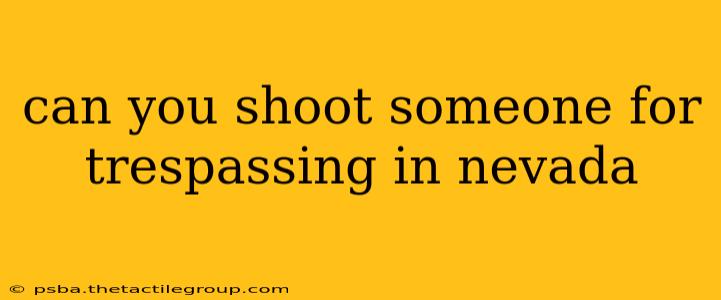Can You Shoot Someone for Trespassing in Nevada? A Comprehensive Look at Nevada's Self-Defense Laws
The question of whether you can shoot someone for trespassing in Nevada is complex and hinges on several crucial factors. While Nevada is a "stand your ground" state, allowing the use of deadly force in self-defense without a duty to retreat, the circumstances surrounding the trespass must meet specific legal requirements. Simply put, no, you generally cannot shoot someone solely for trespassing. The use of deadly force is only justified in very limited situations.
Understanding Nevada's Self-Defense Laws
Nevada Revised Statutes (NRS) 200.100 outlines the justifiable use of force in self-defense. This statute emphasizes the necessity of a reasonable belief that deadly force is necessary to prevent imminent death or serious bodily harm to oneself or another. Crucially, the perceived threat must be imminent—meaning it's happening now or about to happen.
Trespassing vs. Imminent Threat: A Critical Distinction
Trespassing itself, even on your property, does not automatically constitute an imminent threat justifying deadly force. The trespasser must demonstrate actions beyond mere presence that create a reasonable fear of imminent death or serious bodily harm. This could involve:
- Aggressive behavior: Verbal threats, brandishing weapons, or physical assault attempts significantly raise the stakes. A simple verbal warning or even a minor scuffle typically doesn't justify lethal force.
- Prior history of violence: If the trespasser has a known history of violence or has previously threatened you, this can be a factor in determining the reasonableness of your fear. However, this past history alone is not enough. The present threat must still be imminent.
- Felonious activity: If the trespasser is engaging in a felony on your property (e.g., burglary, arson), this increases the likelihood that deadly force might be justifiable. The felony must be in progress, not merely suspected.
What Constitutes "Reasonable Fear"?
The legal standard emphasizes "reasonable fear." This is judged objectively, meaning a jury or judge would evaluate the situation from the perspective of a reasonable person in similar circumstances. Factors considered include:
- The size and strength of the trespasser: A large, aggressive individual might pose a greater threat than a small, unarmed person.
- The presence of weapons: If the trespasser has a weapon, this significantly increases the justification for using deadly force.
- The time of day and location: A trespasser at night in a remote area may present a greater threat than one during daylight hours in a well-populated area.
The Importance of Warning Shots
Warning shots are generally discouraged and can be legally problematic. Firing a weapon, even a warning shot, demonstrates an intent to use deadly force. If the situation escalates, you could face legal consequences even if you didn't intend to harm the trespasser. It's generally safer and more legally sound to call law enforcement.
Seeking Legal Counsel
The use of deadly force in self-defense is a serious matter with potentially severe legal ramifications. If you're ever in a situation where you believe the use of deadly force is necessary, immediately contact law enforcement. Subsequently, seek the advice of a qualified attorney specializing in Nevada criminal defense law to understand your rights and potential legal consequences. This information is for educational purposes only and does not constitute legal advice.
Disclaimer: This information is for informational purposes only and should not be considered legal advice. Consult with a qualified legal professional for advice tailored to your specific circumstances.

